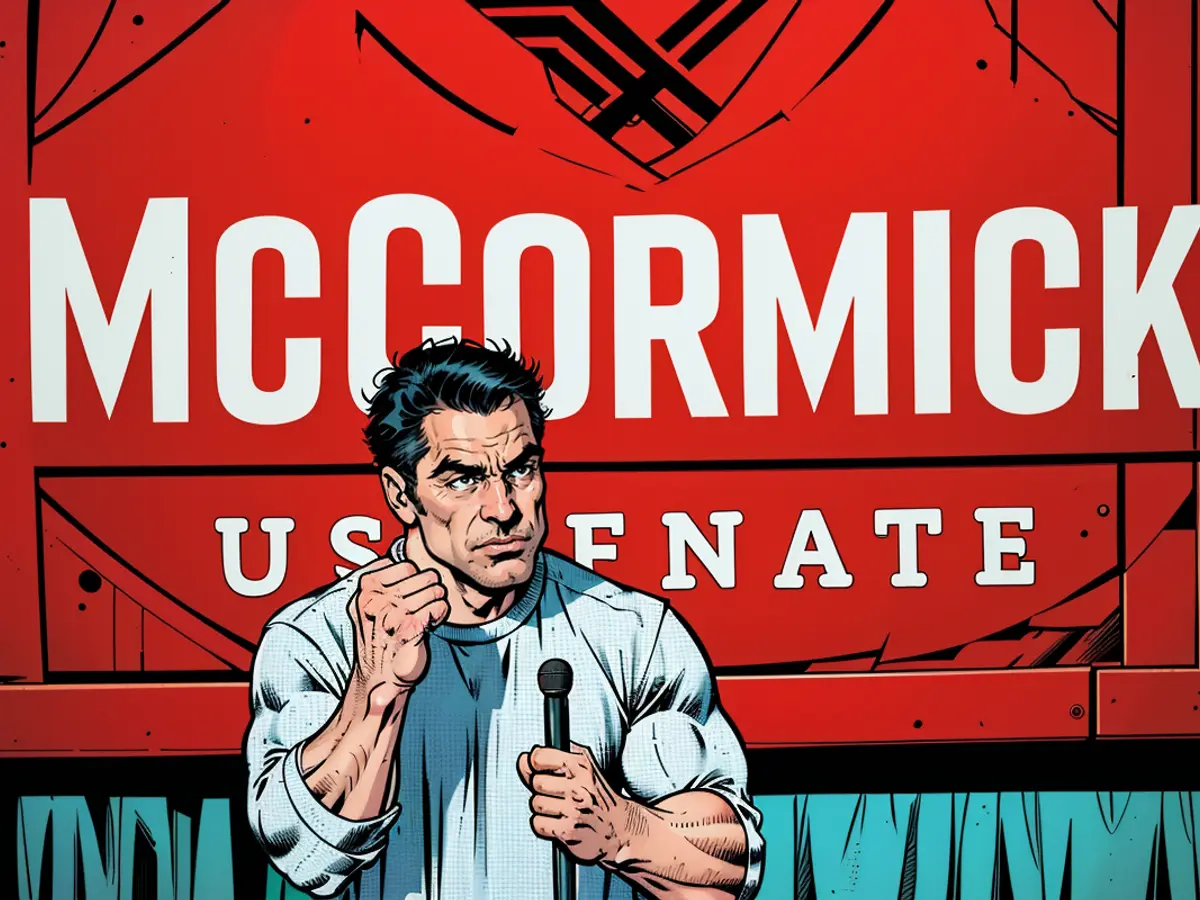Senate contender Dave McCormick headed a hedge fund that wagered against some of Pennsylvania's most symbolic corporate entities.
Under McCormick's management, Bridgewater Associates took short positions on the stocks of around 50 companies based in Pennsylvania, among which were The Hershey Company and US Steel, as investigated by CNN from Department of Labor records.
Short positions, essentially bets that the stocks will decrease, can negatively impact companies by lowering their stock prices, making it harder to acquire financing, invest, or hire more employees, as per experts. For financial institutions, short positions can generate income.
However, what may seem beneficial as an investor could take on a whole new meaning in politics. As McCormick, a Republican contesting Senate for the second time, positions himself as a job creator in Pennsylvania, critics question his understanding of workers' struggles.
Kevin Boltz, an employee of Hershey based in central Pennsylvania and a member of the union representing Hershey employees, voices this sentiment, stating, "I fundamentally think Dave McCormick is out of touch with workers. I don't think this man understands my way of life."
The Pennsylvania elections – a confrontation between McCormick and three-term Democratic Senator Bob Casey – hold significant implications as the Republicans aim to achieve control of the Senate by winning one or two more seats.
As of the past month, Casey has often led McCormick in polling. The Pennsylvania race is marked as one of the most expensive this year, with McCormick investing $4 million of his own funds until the end of June.
McCormick's past at Bridgewater and his broader business background has become the primary topic of discourse in the race. Television advertisements both lauding McCormick's accomplishments and scrimming him have bombarded Pennsylvania's airwaves, and the candidates have argued over his record in their first televised debate.
In a statement, McCormick's spokesperson Elizabeth Gregory defended Bridgewater's investment decisions by arguing that isolating individual short positions of Pennsylvania companies by Bridgewater – a firm overseeing more than a hundred billion dollars and also investing in companies from the state – lacks meaning.
"As CEO of Bridgewater, Dave led one of the most successful investment firms in the world," Gregory said. "During his tenure, Bridgewater was a net investor of hundreds of millions of dollars in PA companies, on behalf of its investors including pension plans for teachers, policemen, and firemen."
Gregory added that McCormick was not involved in daily investment decisions as CEO, emphasizing the linkage between him and individual shorts as illogical and akin to claiming the general manager of a baseball team is responsible for every pitch.
Yet, McCormick has taken responsibility for Bridgewater's investment decisions during his leadership, even as recently as last year.
"I was the CEO, so whatever we did, I'm responsible for," he stated at a 2023 event hosted by a conservative think tank.
How Bridgewater earns money through shorting stocks
McCormick joined Bridgewater in 2009, served as co-CEO in 2017, and became its sole CEO in early 2020 before departing in early 2022.

One of the funds Bridgewater oversaw under McCormick's leadership – Bridgewater Equity Fund – bought or shorted shares of over 2,000 companies between 2017 and 2021. Bridgewater was obliged to report these positions in Labor Department filings for investment funds handling retirement plans. CNN analyzed the filings, records from the Securities and Exchange Commission, and other financial data to identify Pennsylvania companies that Bridgewater Equity Fund shorted.
During McCormick's tenure, the analysis revealed, Bridgewater Equity Fund reported holding short positions worth over $16 million of Pennsylvania company stocks every year, with a peak of $107 million in December 2018. However, these filings only demonstrate the fund's holdings at the end of each year and do not provide a complete picture.
The fund shorted about forty companies from Pennsylvania during McCormick's tenure, as per the records. It held short positions worth over $25 million in Hershey stock by the end of 2018; nearly $12 million in Comcast shares, one of the state's largest employers, by the end of 2019; and over $16 million in Penn National Gaming shares, which operates casinos and racetracks nationwide, by the end of 2021.
The fund did invest in shares of some of the same Pennsylvania companies it shorted in other years, and it reported buying more stocks of Pennsylvania companies than shorting them in four out of the five annual reports analyzed by CNN.
Bridgewater managed over $100 billion under McCormick's leadership, and the reports showing the Pennsylvania short positions represent only a small fraction of the fund's overall positions. A Bridgewater spokesperson declined to comment for this story.
Financially savvy, politically risky
Financial experts note that short selling plays a crucial role in the economy by preventing stocks from getting overvalued and promoting market efficiency.
"Many people do think of short sellers as being predators or betting on failure – but there is, I think, some social value to what they do," said Andrew Jennings, a professor at Emory University School of Law. "In an ecosystem, there are predators... but they’re part of the system. They keep things in balance."
However, from a political standpoint, justifying Bridgewater's short positions on Pennsylvania company stocks might be challenging for McCormick while attempting to appeal to the average Pennsylvania voter, said Dan Mallinson, a professor of public policy and administration at Penn State-Harrisburg.
"They're not really investing in a company to see the company grow – they're playing the market to make money for their investors," Mallinson said. "That's probably hard to explain to someone who isn't super wealthy and is directly impacted by what happens with these companies."
Eric Talley, a corporate law professor at Columbia University, acknowledged that Bridgewater's short positions, led by McCormick, could pose political issues. McCormick had a duty to maximize his clients' returns, Talley stated. However, he noted that when discussing fiduciary duty with students, their interest wanes rapidly. If he expects their support, Talley mentioned, he becomes quite apprehensive.
One of the most politically charged companies Bridgewater shorted under McCormick was US Steel, the renowned manufacturing firm with four significant plants situated near Pittsburgh. Bridgewater Equity Fund made investments in US Steel's stock between 2017 and 2020, with the investment value reaching approximately $67 million by December 2018.
By the conclusion of McCormick's final year as CEO, in 2021, Bridgewater had liquidated its US Steel stock and assumed short positions worth more than $6 million. Simultaneously, it allocated nearly $4 million in Nippon Steel, Japan's top steelmaker, which is currently attempting to acquire US Steel.

The media outlet The Keystone previously reported on Bridgewater's US Steel short positions.
On the campaign trail, McCormick denounced the proposed acquisition of US Steel by Nippon, characterizing it as "disastrous for our commonwealth and harmful for America's security" in a post on X. Casey has also objected to the deal, which is currently undergoing regulatory reviews and may face obstacles from the Biden administration.
Bridgewater's adversarial positions against Pennsylvania businesses contradict McCormick's attempts to garner votes from their employees, claimed Bernie Hall, the Pennsylvania director for United Steelworkers, the union backing US Steel employees and supporting Casey in the Senate race.
"To engage in such activities and display such audacity, seeking votes from those you bet against for failure - that's quite bold," Hall commented.
Gregory, McCormick's spokesperson, argued that Bridgewater employees didn't individually select stocks for long or short positions; instead, they made decisions regarding broader company groups. She defended the short positions taken against Pennsylvania companies by stating that they represented a minuscule portion of each company's overall worth.
Additionally, she highlighted that Casey, while serving as Pennsylvania's State Treasurer between 2005 and 2007, supervised the state retirement plan through Bridgewater. Casey was among the eleven board members overseeing the retirement system.
Controversial Business History of McCormick
The short positions represent only one facet of how McCormick's business dealings have sparked negative publicity during his political career. His two Senate campaigns, in 2022 and this cycle, have been marred by criticism of Bridgewater's ties to Chinese military-backed firms that later faced US sanctions.
In 2021, McCormick told a Congressional committee that he had reservations about Bridgewater's investments linked to the Chinese military's moral and national security risks, often disagreeing with colleagues on China's trajectory.
Local media has also questioned McCormick's claim that he generated hundreds of jobs while managing a Pittsburgh software company in the early 2000s. His leadership of the company spurred both pro and con ads during the election race.
McCormick is among several Republican Senate candidates in 2022 - including Eric Hovde of Wisconsin, Tim Sheehy of Montana, and Bernie Moreno of Ohio - who built their campaigns on their business backgrounds, aiming for political success as self-made entrepreneurs.
However, the criticism directed toward McCormick highlights the potential downside of candidates relying on their business backgrounds to secure political support, according to Mallinson, a Penn State professor.
"It can be both a virtue and a flaw," said Mallinson, who noted that businesspeople tend to disregard the political ramifications of their decisions. "Someone who is in business isn't usually thinking about the political consequences of their actions."

Short positions, regardless of their potential income for financial institutions, can be controversial in politics, especially when it comes to negatively impacting local companies and their employees. For instance, McCormick's management of Bridgewater Associates included short positions on Pennsylvania companies, which could complicate his political image as a job creator.
Critics, like Bernie Hall of the United Steelworkers, question the logic of McCormick seeking votes from the employees of the very companies Bridgewater has shorted, posing a challenging political stance for the candidate.








